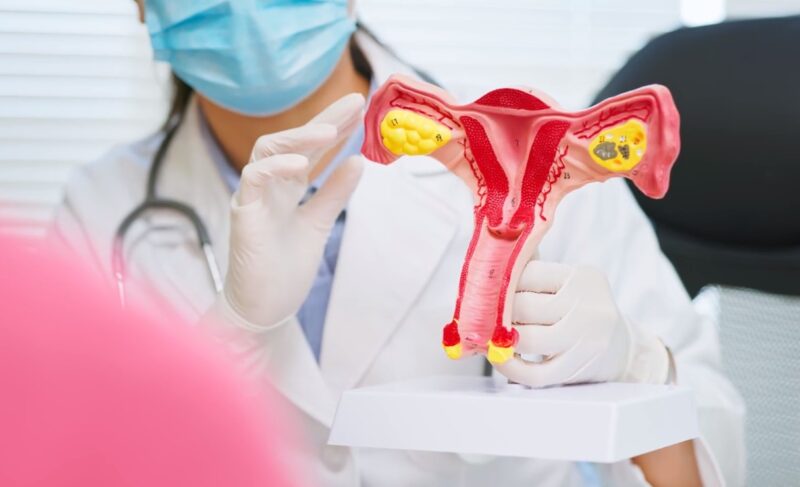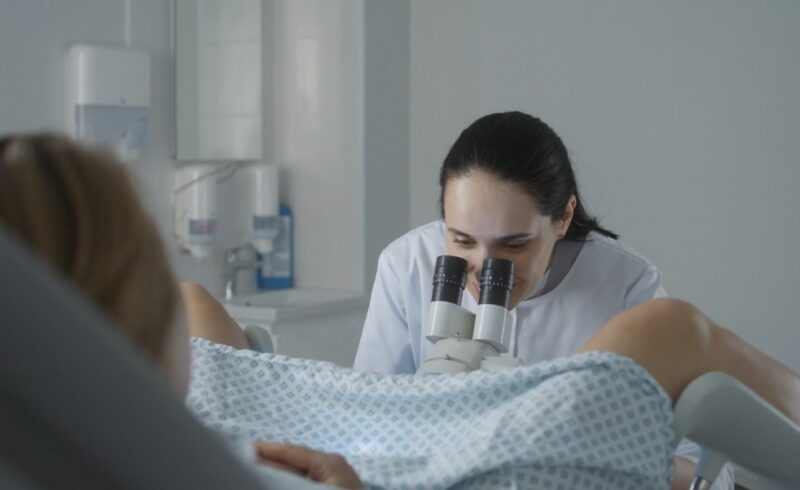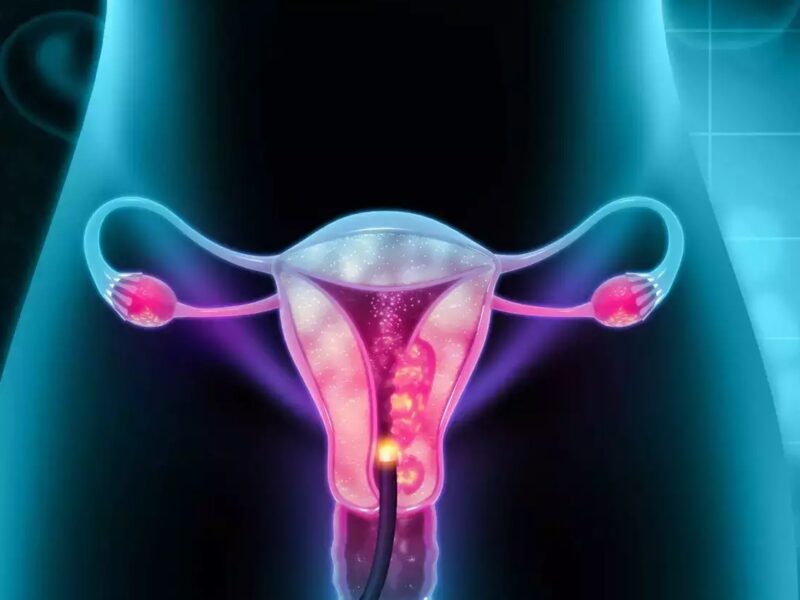Understanding the intricate relation between menstrual cycles and cervical health is essential for women’s well-being. While a missed period is a common concern and usually not a grave sign, it’s crucial to be informed about the potential underlying health conditions it might indicate, such as cervical cancer.
This article aims to illuminate the nuances of cervical cancer and its possible correlation with menstrual irregularities, providing a comprehensive perspective for readers of all backgrounds.
The Basics

Cervical cancer develops in the cells lining the cervix, the lower part of the uterus. It is mainly caused by persistent high-risk human papillomavirus (HPV) infection. Early detection through regular screenings can significantly increase the chances of successful treatment.
Risk Factors and Symptoms
Understanding the risk factors and identifying the symptoms early can lead to better management and prevention of cervical cancer.
Risk Factors
- Persistent HPV infection is the most significant risk factor for cervical cancer.
- Smoking, having a weakened immune system, and long-term use of birth control are also notable factors contributing to the development of this cancer.
- Lifestyle and sexual behavior, including having multiple sexual partners, can also increase the risk.
Symptoms
- Early stages of cervical cancer may be asymptomatic, making regular screenings crucial.
- As the disease progresses, one may experience unusual vaginal bleeding, pelvic pain, or pain during intercourse.
The Role of HPV
HPV is predominantly known for its role in the development of cervical cancer. It is a group of more than 200 related viruses, with some capable of causing cancer.
High-Risk HPV Strains
- HPV types 16 and 18 are responsible for about 70% of all cervical cancers.
- The persistent infection of high-risk strains can lead to cellular changes, eventually developing into cancer if left untreated.
Vaccination and Prevention
- Receiving the HPV vaccine can protect against the most common types of the virus responsible for cervical cancers.
- Regular Pap and HPV tests can aid in identifying any abnormal changes in the cervical cells early on, enabling prompt intervention.
Connection With Menstrual Irregularities

A missed period can be quite common and is usually not a sign of cervical cancer. However, it’s pivotal to discern when it could be indicative of serious health concerns.
Reasons for Missed Periods
Missed periods are usually associated with a variety of reasons, many of which are benign and easily manageable.
Common Causes
- Stress, significant weight loss or gain, and excessive exercise are common reasons for a missed period.
- Polycystic ovary syndrome (PCOS), thyroid disorders, and chronic illnesses can also cause menstrual irregularities.
- Pregnancy and menopause are natural life stages that lead to changes in menstrual cycles.
Understanding the Causes
- It is essential to recognize and understand the root cause of missed periods to ensure proper management and care.
- Lifestyle modifications, medication adjustments, or addressing underlying health conditions can help in managing menstrual irregularities effectively.
Connection With Menstrual Disruptions
Although not a direct symptom, disruptions in menstrual cycles can be indirectly related to cervical cancer.
Indirect Correlation
- Cervical cancer may cause abnormal bleeding, which might be mistaken for menstrual irregularities.
- The presence of cervical cancer can affect hormonal balance, possibly leading to disruptions in the menstrual cycle.
Early Detection is Key
- Given the potential implications, any persistent menstrual irregularities, especially with other symptoms, should prompt medical consultation.
- Regular screenings and prompt attention to abnormal symptoms can significantly aid in the early detection and treatment of cervical cancer.
Preventive Measures and Healthy Practices

Maintaining cervical health requires adopting preventive measures and healthy practices, including regular screenings and vaccinations.
Regular Screenings and Check-ups
Regular cervical screenings are pivotal in detecting any abnormal changes or infections early, potentially preventing the development of cervical cancer.
Importance of Pap Smears
- Pap smears are essential for identifying precancerous changes in the cervical cells, allowing for early intervention.
- Women should start getting Pap smears at age 21 and continue every three years if the results are normal.
HPV Tests and Vaccinations
- Regular HPV tests are recommended for women over 30, alongside Pap smears.
- Getting vaccinated against HPV is crucial in preventing infections that could lead to cervical cancer.
Healthy Lifestyle and Habits

A healthy lifestyle, including regular exercise and a balanced diet, can play a significant role in maintaining overall well-being and cervical health.
Healthy Diet and Regular Exercise
- Consuming a diet rich in fruits, vegetables, and lean proteins can support immune function and overall health.
- Regular physical activity can help in maintaining a healthy weight and reducing the risk of various cancers, including cervical cancer.
Safe Sexual Practices
- Using condoms and limiting the number of sexual partners can reduce the risk of HPV infection.
- Regular STI screenings are essential for identifying and treating infections early and preventing complications.
Mindfulness and Stress Management
- Stress can have significant implications on menstrual cycles and overall health. Thus, incorporating mindfulness, meditation, and relaxation techniques can be beneficial.
- Regular exercise, adequate sleep, and stress-reducing activities can aid in maintaining emotional and physical well-being, contributing to healthier reproductive systems.
Navigating Health Solutions

When facing a missed period or any menstrual irregularities, exploring viable health solutions and understanding the available resources is crucial.
Seeking Medical Advice
Approaching a healthcare professional or a gynecologist is the first step in addressing any concerns related to menstrual irregularities and potential risks of cervical cancer.
Consultation and Examination
- Discussing menstrual irregularities and other symptoms with a healthcare provider can help in identifying any underlying conditions.
- A thorough examination, including Pap smears and HPV tests, can assist in detecting abnormalities or infections early, allowing for timely intervention.
Tailored Treatment Plans
- Based on the diagnosis, healthcare providers can suggest appropriate treatment plans tailored to individual needs.
- Early-stage cervical cancer can often be treated successfully with surgery, radiation therapy, or chemotherapy, emphasizing the importance of early detection.
Empowering through Education
Educational resources and awareness campaigns play a crucial role in empowering individuals to take charge of their cervical health.
Awareness and Accessibility
- Public awareness campaigns, educational programs, and accessible information can significantly enhance understanding and management of cervical health.
- These initiatives can help destigmatize cervical cancer and encourage more people to opt for regular screenings and vaccinations.
Community Support and Resources
- Community support groups and online forums can offer a platform for sharing experiences, gaining insights, and finding support in dealing with cervical health concerns.
- Accessible healthcare resources and services can facilitate timely interventions and support individuals in navigating their health journey effectively.
Staying Informed and Proactive

Staying informed about the latest research and advancements in cervical health and being proactive in managing reproductive health is crucial.
Ongoing Research and Development
- Keeping abreast of the latest studies, research findings, and developments in cervical cancer can aid in adopting effective preventive measures and treatments.
- Scientific advancements and innovative treatments continue to improve the prognosis and management of cervical cancer, enhancing the quality of life for affected individuals.
Personal Responsibility and Proactivity
- Taking personal responsibility for one’s health and adopting a proactive approach in regular health check-ups and screenings can lead to early detection and treatment of any abnormalities.
- Embracing a preventive mindset and fostering health-conscious habits can significantly impact individual and community health outcomes, paving the way for a healthier society.
FAQs
Can Cervical Cancer Be Completely Cured if Detected Early?
Yes, it has a high cure rate when detected and treated in its early stages. Early detection, usually through regular Pap smears and HPV tests, allows for more effective treatment options such as surgery, chemotherapy, or radiation therapy, depending on the stage and type of cancer.
How Often Should One Undergo Screenings for Cervical Cancer?
It is generally recommended that women between the ages of 21 and 29 have a Pap smear every three years. Women between the ages of 30 and 65 should ideally have a Pap smear and an HPV test every five years or a Pap smear alone every three years.
However, these recommendations can vary depending on individual risk factors and medical history, so consult with your healthcare provider for a schedule that’s right for you.
Does Having Hpv Guarantee that I Will Get Cervical Cancer?
No, having HPV does not guarantee it. In fact, many HPV infections are transient and clear up on their own. However, persistent infection with high-risk HPV types can lead to cellular changes that may develop into cervical cancer if not detected and treated early.
Are There Lifestyle Changes I Can Make to Lower My Risk of Developing Cervical Cancer?
Absolutely, maintaining a healthy lifestyle, practicing safe sex, avoiding smoking, and limiting the number of sexual partners can reduce the risk of HPV infection and, subsequently, cervical cancer.
Additionally, maintaining a healthy immune system through a balanced diet, regular exercise, and stress management can also play a significant role in reducing risk.
Can I Still Get Cervical Cancer if I’ve Received the Hpv Vaccine?
While the HPV vaccine significantly reduces the risk by protecting against the most common high-risk HPV strains, it does not eliminate the risk entirely, as there are other high-risk HPV types not covered by the vaccine. Regular screenings are still crucial even if you have been vaccinated.
How Does Cervical Cancer Impact Fertility?
Cervical cancer and its treatments can impact fertility. Some treatments, such as certain surgeries or radiation therapy, can affect the reproductive organs, making it difficult or impossible to conceive.
However, early detection and treatment can help in preserving fertility and fertility-sparing treatment options are available in some cases. Discuss your fertility preservation options with your oncologist and a fertility specialist if you are diagnosed with cervical cancer and wish to have children in the future.
Final Words
Cervical cancer, albeit a severe health concern, is preventable and treatable with early detection and proper management. While a missed period is commonly due to benign factors, it’s crucial to remain vigilant about potential signs and symptoms of underlying health conditions, including cervical cancer.
Regular screenings, healthy lifestyle choices, and safe sexual practices are paramount in maintaining cervical and reproductive health. Knowledge and awareness empower individuals to make informed decisions about their health and well-being, fostering a proactive approach to cervical health management.
